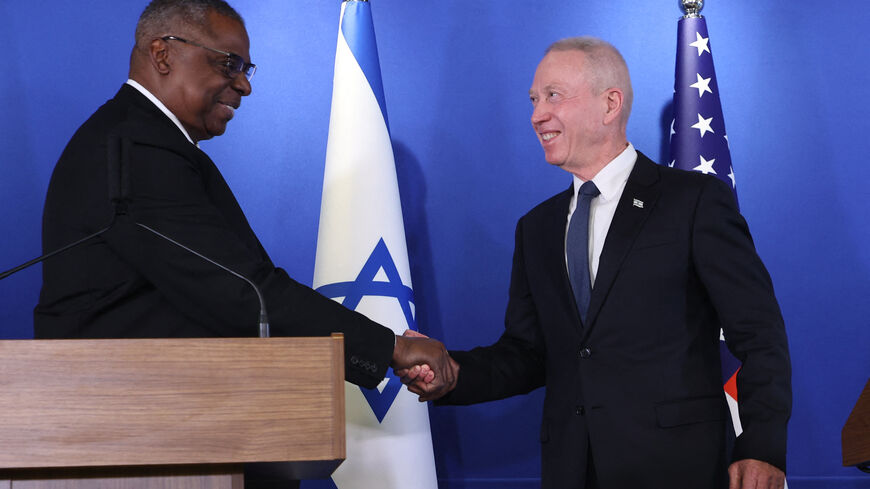The Biden administration’s disapproval of Prime Minister Benjamin Netanyahu’s moves to weaken Israel’s judiciary won’t inhibit military ties, American officials reaffirmed Tuesday.
A narrow majority of 64 lawmakers in Israel's Knesset voted on Monday to advance the measure to curb the power of Israel’s Supreme Court, bucking repeated entreaties by the US not to move ahead.
Despite the decision, Washington’s support for Israel as a regional military power and counterweight to Iran is not in question, officials suggested following the vote.
“There is not going to be any cut or stoppage of military aid,” State Department spokesperson Vedant Patel clarified to reporters Tuesday. “That’s because our commitment to Israel and our commitment to Israel’s security is ironclad.”
Defense Secretary Lloyd Austin spoke with his Israeli counterpart Yoav Gallant on Tuesday to reiterate Washington’s fidelity, while underscoring US support for broad democratic consensus via political dialogue and the need for de-escalation with Palestinians in the West Bank.
“Austin made clear the US commitment to Israel’s security is steadfast and unwavering,” read a Pentagon readout following the call. The defense chief went further, saying his department remains “focused on initiatives that deepen military cooperation" with Israel.
Austin and Gallant also “discussed the range of Iran-backed threats to regional security and stability and agreed to continue working together to counter these threats,” according to the readout.
He also urged his Israeli counterpart "to address extremist settler violence against Palestinian civilians and continue the Israeli Ministry of Defense's efforts to improve economic opportunities for Palestinians in the West Bank."
Why it matters: The Biden administration has walked itself into a bind.
Despite Biden's pledge to defend global democracy, his administration appears keen not to give Republicans an opening to criticize Democrats ahead of the 2024 US presidential elections.
As candidates, Biden and Vice President Kamala Harris vowed that US military aid would remain off-limits as a tool of leverage during political disagreements with Israel, even as Netanyahu’s previous government was still reportedly weighing West Bank annexation plans.
Biden’s campaign promise followed increasing calls from progressive Democrats for Washington to leverage its annual $3.8 billion in assistance to Israel to prevent further steps by the Israeli government that could preclude an eventual two-state solution to the conflict with the Palestinians.
Soon after winning elections last November, the Netanyahu-led ultranationalist coalition amended the country’s basic law to pave the way for a newly created minister to oversee administration in the West Bank. Critics and major Israeli human rights groups decried the move as a step towards de facto annexation.
Behind closed doors, US defense officials have grown increasingly frustrated over the moves to approve settlement expansion in the occupied Palestinian territory.
Pentagon officials speaking not for attribution have cited the potential for the Israeli government’s moves to spark a third Palestinian intifada, as well as the political infeasibility for additional Arab states to normalize relations with Israel if Netanyahu’s coalition moves forward.
In March, Pentagon chief Austin took the unusual step of issuing a full-throated endorsement of an independent judiciary as foundational to both US and Israeli democratic governance after meeting Netanyahu and Gallant in Tel Aviv.
The Pentagon under Biden has granted Netanyahu’s government major asks, including long sought-after joint war games simulating strategic strikes akin to those that would be needed to target Iran’s nuclear sites. Top Pentagon officials have also reportedly offered to bring Israeli counterparts into shared operational planning for such an event, drawing skepticism in the Israeli defense establishment.
“In terms of our readiness or force posture changes, nothing has changed on Iran,” Pentagon deputy press secretary Sabrina Singh told reporters on Tuesday, when asked about Israeli military readiness amid unprecedented internal dissent in reaction to the judicial overhaul.
“We still view Israel as a partner in the region, so nothing has changed in terms of our presence or how we conduct operations or exercises with Israel,” she said.
What's next: The IDF said the commander of all US forces in the Middle East, Army Gen. Michael "Erik" Kurilla, arrived in Israel Wednesday for meetings tomorrow with IDF chief Herzi Halevi and members of the military intelligence directorate.
Know more: Biden’s attempt to ease tensions by finally offering Netanyahu an in-person meeting during phone call last week proved too little, too late.
Just days prior, the administration granted the Israeli government another win by signing an agreement opening the path for Israel to join the US' visa waiver program.
The Israeli military says the massive protests against the judicial overhaul haven’t hampered its preparedness yet, but that’s likely to change if any sizeable contingent of some 10,000 reservists follow through on threats not to show up for duty, Ben Caspit writes.








